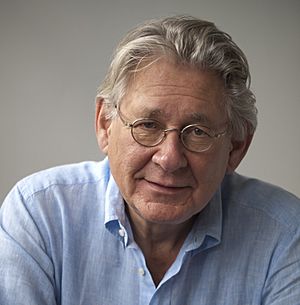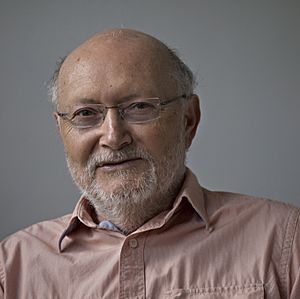Leo Panitch facts for kids
Quick facts for kids
Leo Panitch
FRSC
|
|
|---|---|

Panitch in 2012
|
|
| Born |
Leo Victor Panitch
3 May 1945 |
| Died | 19 December 2020 (aged 75) |
| Alma mater | |
| Known for | The Socialist Register (co-editor) |
|
Notable work
|
The Making of Global Capitalism (2012) |
| Spouse(s) |
Melanie Panitch
(m. 1967) |
| Children | 2 |
| Scientific career | |
| Institutions | |
| Thesis | The Labour Party and the Trade Unions (1973) |
| Doctoral advisor | Ralph Miliband |
| Influences | Ralph Miliband, Karl Marx, Nicos Poulantzas |
| Influenced | Bhaskar Sunkara |
Leo Victor Panitch (May 3, 1945 – December 19, 2020) was a respected professor. He taught political science and political economy at York University in Canada. Political science is the study of how governments work. Political economy looks at how politics and the economy are connected.
From 1985 until 2021, he helped edit the Socialist Register. This is an annual book that shares ideas from a group called the "independent new left." Panitch believed the Register helped explain Marxism. Marxism is a way of understanding society, history, and economics. He thought it could help create a fair and equal socialist society. This would be an alternative to capitalism, which he saw as unfair.
After 2002, Panitch focused on how global capitalism was spreading. Global capitalism means that businesses and money move freely around the world. He argued that the United States government was leading this process. He saw this as a type of imperialism. Imperialism is when one country has a lot of power over others. Panitch called it an "informal" empire. This meant the US set rules for trade and investment. It did this with other countries that were less powerful.
His book, The Making of Global Capitalism: The Political Economy of American Empire (2012), explains these ideas. He wrote it with his friend Sam Gindin. The book won important awards in 2013 and 2014. Panitch wrote over 100 articles and nine books. He believed that capitalism was naturally unfair and undemocratic.
Contents
Early Life and Learning
Leo Panitch was born on May 3, 1945, in Winnipeg, Manitoba, Canada. He grew up in a working-class area of Winnipeg. He later said this area produced many people with "radical left" political ideas. His parents were Jewish immigrants from Ukraine. His father, Max Panitch, was a fur coat maker. He was active in the labour movement and politics. The labour movement works to improve conditions for workers.
Panitch's mother, Sarah, came to Winnipeg from Ukraine when she was 13. Max and Sarah married in 1930. Their first son, Hersh, was born in 1934.
Panitch went to a Jewish school named after a writer called I. L. Peretz. He explained that the school came from socialist groups. These groups helped Jewish immigrants. He said that for many people in Winnipeg, being Jewish meant being radical.
In 1967, Panitch earned a degree in economics and political science. This was from the University of Manitoba. During his studies, he realized that Karl Marx's ideas helped him understand capitalism. He learned about "industrial democracy." This is the idea that workers should control their workplaces. Panitch felt that his generation wanted socialism. They saw how unfair and unequal capitalist societies were.
At age 22, Panitch moved to London, England. He earned two more degrees from the London School of Economics (LSE). He got his Master of Science degree in 1968. He finished his Doctor of Philosophy degree in 1974. His PhD paper was about the Labour Party and trade unions. It was later published as a book. His teacher for this paper was Ralph Miliband.
Academic Work and Ideas
Panitch taught at Carleton University from 1972 to 1984. Then he became a professor at York University in 1984. In 2002, he became a Canada Research Chair. This meant he focused on studying global capitalism. He looked at how the American government and large international companies influenced it.
He helped start the Canadian academic journal Studies in Political Economy in 1979. He was also active in socialist political groups. He wrote a regular column for a socialist magazine called Canadian Dimension. In 1995, he became a member of the Royal Society of Canada. This is a group of top Canadian scholars.
Panitch edited 33 yearly volumes of the Socialist Register. He also wrote many articles and nine books. He saw the Register as an important link between new left ideas and his mentor, Ralph Miliband. He tried to make the books easy to read but with deep ideas.
In 2010, Panitch spoke about his book In and Out of Crisis. He argued that during the global economic crisis, people on the left side of politics lacked ambition. He suggested changes like making banks public services. He also suggested public pensions and free healthcare. These ideas aimed to make society more fair.
Understanding Global Capitalism
In 2012, Leo Panitch and Sam Gindin published The Making of Global Capitalism: The Political Economy of American Empire. This book studied how global capitalism grew over more than a century. Panitch and Gindin argued that globalization didn't just happen. It was planned and managed by the United States.
They disagreed with the idea that large international companies are more powerful than countries. They said that countries and capitalism are closely linked. Countries protect property rights and make contracts. They also sign free trade agreements. In return, they get taxes and support from successful businesses.
Panitch and Gindin also said that the American Empire was not declining. They argued the opposite was true. American companies changed how they produced goods. They moved some work to cheaper places. This helped the American economy. The strong US financial system also helped. It provided money for new, high-tech companies. As a result, the US still produced about a quarter of the world's goods.
America's Role in Global Capitalism
Panitch and Gindin believed that the foundations for American-led global capitalism were set in the 1930s. This was during the Great Depression. The US government strengthened its financial institutions. It also created new economic rules. When the US entered World War II, its military power grew.
These strong financial and military groups made the US a Great Power. It could then guide the spread of its own type of capitalism. The US also led global groups like the International Monetary Fund and the World Bank. The American dollar became very important for international finance. The US helped rebuild Europe and Japan after the war. This created chances for US companies to invest there.
America's Informal Empire
Panitch and Gindin said that the US leads an "informal" empire. Other rich capitalist countries are still independent. But they often agree with the US on military actions abroad. The US claimed the right to act against other countries. It also largely decided how international rules were followed.
From Good Times to Crisis
The book talks about the "golden age" of capitalism in the 1950s and 60s. During this time, businesses made high profits. The American economy was booming, and many people had jobs. Workers also benefited from better social programs and higher wages.
But capitalism often has problems. In the 1970s, there was "stagflation." This meant high inflation (prices going up) and high unemployment (people out of work). Economies were not growing, and profits were falling.
In 1979, Paul Volcker, who led the US Federal Reserve, raised interest rates very high. This caused a deep recession. Many people lost their jobs. This led to less power for labour unions. In the 1980s, new policies called neoliberalism were adopted. These policies limited workers' rights. They made it easier for businesses to control workers. Wages stayed low, and union membership went down. Neoliberalism also led to many free trade agreements. These agreements helped companies invest and produce goods worldwide.
Panitch and Gindin said that the neoliberal era brought another "golden age." But this time, only the rich capitalist class benefited. Workers' wages did not grow, and union membership fell.
Global Financial Problems
The book's last chapter looks at the financial crisis of 2007–2008. This crisis ended high company profits. Millions of people lost their homes, and people spent less money. Panitch and Gindin wrote that this crisis followed decades of growth in risky financial markets. These markets were key to capitalism's growth. They argued that the US encouraged these risky markets. Even though it often had to fix financial problems, like the 1997 Asian financial crisis.
They added that when housing prices fell, people in the US spent much less. This was because their homes were a main source of their wealth. The authors noted that the US, as the manager of global capitalism, again helped out. It gave billions of dollars in bail-out money to banks.
Personal Life
Panitch married Melanie Pollock in 1967. She is a human rights activist. She teaches at Toronto Metropolitan University in Toronto. In 2006, Melanie Panitch earned a doctorate in social welfare. Her paper was about mothers' efforts to gain human rights for disabled Canadians.
The Panitches had two children. Maxim is a photographer and writer. Vida is a philosophy professor at Carleton University.
Leo Panitch spoke three languages: English, French, and Yiddish. He and his wife lived in Toronto, Ontario.
Leo Panitch passed away on December 19, 2020. He had viral pneumonia linked to COVID-19. He caught COVID-19 in the hospital while being treated for another illness.
Works
Books
- The Socialist Challenge Today (new expanded edition) (co-authored with Sam Gindin and Steve Maher), Merlin Press: 2020
- The Making of Global Capitalism: The Political Economy of American Empire (co-authored with Sam Gindin), Verso: 2012
- In and Out of Crisis: The Global Financial Meltdown and Left Alternatives (co-authored with Greg Albo and Sam Gindin), PM Press: 2010
- Renewing Socialism: Transforming Democracy, Strategy and Imagination, Merlin Press: 2008
- From Consent to Coercion: The Assault on Trade Union Freedoms (co-authored with Donald Swartz), University of Toronto Press: 2003
- The End of Parliamentary Socialism: From New Left to New Labour (2nd edition) (co-authored with Colin Leys), Verso: 2001
- Working Class Politics in Crisis: Essays on Labour and the State, Verso: 1986
- The Canadian State: Political Economy and Political Power (editor), University of Toronto Press: 1977
Articles
- Superintending Global Capital (co-authored with Sam Gindin), New Left Review 35, 2005
- Global Capitalism and American Empire (co-authored with Sam Gindin), Socialist Register 40, 2004
- The New Imperial State, New Left Review 2, 2000
- The Impoverishment of State Theory, Socialism and Democracy 13, no. 2, 1999
- Globalisation and the State, Socialist Register 30, 1994
- Trade Unions and the Capitalist State, New Left Review 125, 1981
- Dependency and Class in Canadian Political Economy, Studies in Political Economy 6, no. 1, 1981
- Recent Theorizations of Corporatism: Reflections on a Growth Industry, The British Journal of Sociology 31, no. 2, 1980
- The Development of Corporatism in Liberal Democracies, Comparative Political Studies 10, no. 1, 1977
See also
 In Spanish: Leo Panitch para niños
In Spanish: Leo Panitch para niños
 | Claudette Colvin |
 | Myrlie Evers-Williams |
 | Alberta Odell Jones |


